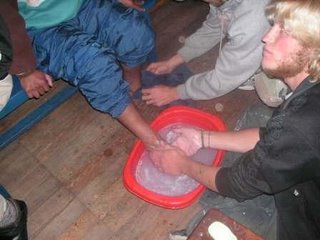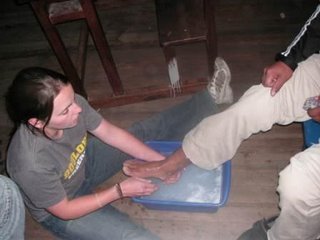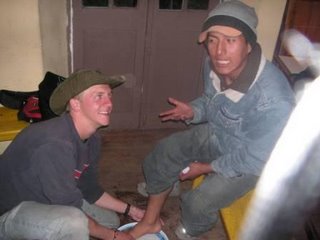I used be of the philosophy, like most, that we will have mansions in heaven. This week I visited a small, isolated, jungle village and stayed in a mud shack and my philosophy is beginning to change.
We hiked away from La Paz for two and a half days and arrived in a mountain jungle town named Chulumani. There we caught a minibus that carried us turbulently over thousand-foot-cliffs for three hours. We got to our destination town just after the sun set. We opened the thin metal door of the dusty house. It was made of mud bricks, roofed in by metal sheeting. Magno (a shoe shiner in La Paz) had brought us here because he wanted to show us his life living in the jungle.
That night we all cut up carrots and peeled peas to help Magno make a simple soup for us. It was delicious and nutritious to my stomach and my heart. As we helped Magno fix dinner, ate together, talked and went to bed so close together, I thought, this is what we lack in American homes. Mom’s cooking dinner in the kitchen while the kids are watching TV in the TV room, and dad is in his car listening to talk radio on the way home in time for hopefully a quick dinner together. We hardly ever have an excuse to be working and living so close to each other like a house with only one room provides.
The next day we got on sandals (made of cut up tires stapled together) and hiked three hours more up into the hillsides of the jungle. They had cleared away the trees in places and terraced the land to plant crops like coca, cotton, coffee, oranges, manderines, bananas, and they harvested a lot of it every year. We cut off a big bunch of bananas, and plucked our backpacks full of mandarins and oranges and hiked up to another mud shack built into the hillside to cook lunch. We stoked the fire under the clay stove as we peeled the bananas, potatoes, and peas for lunch. Magno cooked up the soup and we ate our fill, courtesy of the land. Then we squeezed the oranges and mandarins into delicious juice before taking a nap in the sun.
The hike up was hard: thin air, slipping rocks and blistered feet. But there were moments when we got to a clearing and could see how far we’d come, from the river in the deep valley cutting through the massive mountains. And then we’d turn and realize we were among orange trees that held out their ripe fruit to freely pluck as we walked by and Aloe Vera plants waiting for us to spread their ointments on our sun-kissed skin. Cotton trees held out their buds bursting with celestial gauze for our blisters. This mountain had everything we would need, and it had it in abundance.
Ever since I had the dream where my mom told me she didn’t know if she liked heaven that much yet, I have begun to gaze upward in search of a new metaphor.
Do you think, my friend, that perhaps heaven is a challenging hike that takes us higher and higher? Maybe, each day we get closer to being like God, and getting blisters and acclimatizing to the thin air is part of the training? I think in order for people to always be able to be generous in heaven, the resources must be limitless. When we need it, God holds out all the fruit that we need for new energy, the cotton to help in the toughening process for our feet, and the ointment to heal our skin, not quite ready for the intensity of His light.
Perhaps it is a steep, narrow path but when the trees open up and we can see how far we’ve come, how much bigger and grander the view is, and how small we are in comparison, we will realize that we are getting closer and closer to the heart of our creator. And that we are becoming more like him as we strive on.



